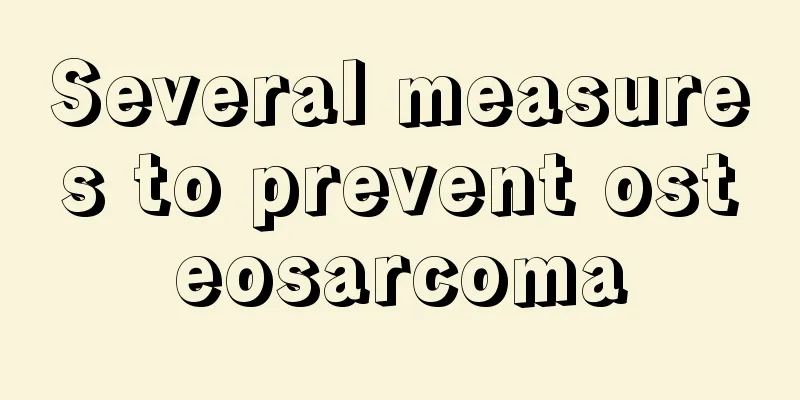Did you know that colorectal cancer can be cured?

|
According to the latest data, there are about 130,000 new cases of colorectal cancer in China each year. What is disturbing is that statistics from various countries show that the incidence of colorectal cancer, especially colon cancer, is rising rapidly, and young patients have always accounted for a certain proportion. Can colorectal cancer be cured? Let's focus on this question and ask experts to introduce it to you. The incidence of colorectal cancer now accounts for about 12%-15% of all malignant tumors in the body. It is a common malignant tumor in my country. With the improvement of people's living standards and changes in living conditions and living habits, the incidence of colorectal cancer has been on an upward trend, especially in large and medium-sized cities. The age of onset is mostly around 45 years old. If you see a doctor as soon as possible when some early symptoms of colorectal cancer appear, the cure rate of cancer can be increased. It is understood that intestinal cancer usually refers to colorectal cancer, because the probability of small intestine cancer is extremely low. Colorectal cancer can be divided into two parts: colon cancer and rectal cancer. Doctors said that from the cases of colorectal cancer, obesity is related to the incidence of colorectal cancer. Therefore, the cause of colorectal cancer has a lot to do with people's eating habits. With the improvement of living standards, Chinese people who originally ate more vegetables and grains now start to eat a lot of meat and dairy products. High calories, excessive intake of animal fat and cholesterol, and obvious lack of fiber and vitamins all increase the incidence of colorectal cancer. Fried, grilled and pickled foods contain carcinogens, and the lack of certain other trace elements also increases the incidence of colorectal cancer. A greasy diet can increase the concentration of bile acid and neutral sterols in the colon, change the composition of the coliform flora, and gradually form carcinogens in the intestine. Food additives (meat and fish treated with nitrite, such as bacon, ham, salted fish, etc.) and some drugs (such as pilamidone, chlordiazepoxide, oxytetracycline, etc.) also contain carcinogens. Early detection of symptoms is crucial for the treatment of colorectal cancer. Experts say that because colorectal cancer is very easy to metastasize, if you seek medical treatment as soon as possible when early symptoms appear, you can increase the cure rate of colorectal cancer. The early symptoms of colorectal cancer are not very obvious, but people can still detect it early through some daily signs. Experts emphasize that people should check for colon cancer by using digital rectal examination during physical examinations, because rectal cancer is usually within 8 cm of the anus. When a finger is inserted through the anus, the lump can be felt. Then a rectal scope is inserted for observation and biopsy of the tissue can be taken for pathological examination. The diagnosis can be confirmed. The detection rate of digital rectal examination has reached more than 80%. However, doctors have found that many people are unwilling to do digital rectal examination during physical examinations because they are afraid of pain or embarrassed, which can easily delay the disease. In addition, screening methods for early diagnosis of colorectal cancer can also be performed through various methods such as fecal occult blood test, fiber colonoscopy, electronic endoscopy, barium enema X-ray, etc. Experts told reporters that early colorectal cancer is not a terminal illness. It can be cured if diagnosed and treated as soon as possible. At present, the 5-year survival rate of rectal cancer has increased from 50% to 70%; the 5-year survival rate of colon cancer has increased from 70% to 80%. The treatment method is a comprehensive treatment with surgery as the main treatment. After colorectal cancer is diagnosed, surgical resection should be performed as much as possible. If the lesion has not spread, surgical resection may have satisfactory results. Improve eating habits. Arrange daily diet reasonably, eat more fresh fruits, vegetables and other foods rich in carbohydrates and crude fiber, appropriately increase the proportion of coarse grains and whole grains in the staple food, and do not eat too fine or too refined. Change the habit of eating meat and high-protein foods as the staple food. Eat less high-fat foods, especially control the intake of animal fat. Therefore, a high-fat, high-protein, low-fiber diet produces more carcinogens, which act on the large intestine for a long time, and will inevitably lead to an increase in the incidence of colorectal cancer. Actively prevent and treat intestinal diseases and take physical exercise. Prevent various polyps, chronic enteritis (including ulcerative colitis), schistosomiasis, chronic dysentery, etc. Intestinal polyps should be treated early. Colon polyps are divided into five categories, namely adenomatous polyps, metaplastic polyps, inflammatory polyps, hamartomatous polyps, etc. Among them, adenomatous polyps are true tumor polyps and a precancerous lesion of colorectal cancer. Therefore, when adenoma is found in the large intestine, it should be treated, the adenoma should be removed and pathological examination should be performed. It is hoped that it will be removed at the benign adenoma stage to prevent colorectal cancer. If not treated early, most of them will develop colorectal cancer, and the prognosis is poor. In addition, habitual constipation should be actively treated, and attention should be paid to keeping the bowels smooth. Regular check-ups. People at high risk of colorectal cancer, such as men over 40 years old, patients with familial multiple intestinal polyps, patients with ulcerative colitis, patients with chronic schistosomiasis, and people with a family history of colorectal cancer, should have regular check-ups and be alert to the warning signs and early symptoms of colorectal cancer, such as changes in bowel habits, alternating diarrhea and constipation, bloody or black stools, and flatter and thinner stools. The above is some of the knowledge we have prepared for you today about whether colorectal cancer can be cured. We hope it can be helpful to you. If you have any other needs, you can also consult our online consulting experts. We are always available to answer your questions and give you more detailed guidance. Colorectal cancer: http://www..com.cn/zhongliu/dca/ |
<<: How to prevent ovarian cancer
>>: How to treat advanced esophageal cancer?
Recommend
What is tartaric acid
When it comes to tartaric acid, many people may h...
What causes stomach hunger pain
In daily life, we often feel hungry and painful i...
Immunotherapy after colon cancer surgery
Colon cancer is a common malignant tumor, and col...
Do you know the nine healthy ways to eat vinegar?
Vinegar is a commonly used condiment and also a h...
Is liver cancer contagious?
Is liver cancer contagious? Many family members a...
What to do if you feel like vomiting after eating too much
Everyone has their favorite food. Once they encou...
Will renal hamartoma lead to poor appetite? A detailed discussion of several effects of renal hamartoma
Renal hamartoma is a benign tumor that often occu...
Is crape myrtle poisonous?
Many people like to grow flowers to cultivate the...
Can early lung cancer be cured?
Can lung cancer be cured in the early stages? Man...
Finger bandage method
Mastering first aid knowledge is essential common...
Advantages and disadvantages of surgical treatment of thyroid cancer
Thyroid cancer is a malignant tumor. The prognosi...
How to treat acute periodontitis?
"Toothache is not a disease, but it can be f...
Keloid scar on chest
Human skin is very fragile, especially keloids on...
How to identify pure honey
In order to get rich overnight, many businesses n...
How to choose diet before ovarian cancer surgery
The onset of ovarian cancer has a great impact on...









